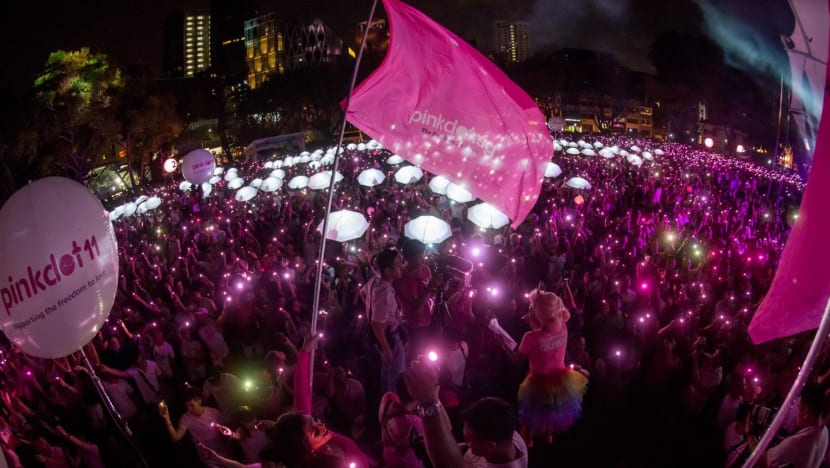377A repeal: Parliamentarians must continue to be 'voice of the community', says Pink Dot

Pink Dot's 2019 event. (Photo: Pink Dot/Facebook, yan.dao.kia/Instagram)
SINGAPORE: On a day when a colonial-era law criminalising gay sex was removed from the books, advocacy group Pink Dot SG called on parliamentarians to “continue to be the voice" of the LGBTQ+ community.
On Tuesday (Nov 29), Singapore’s Parliament repealed Section 377A of the Penal Code, which penalises sex between men. A constitutional amendment to protect the definition of marriage, as being between a man and a woman, against legal challenge was also passed.
In a statement, Pink Dot urged Members of Parliament to act on "critical topics" like education, housing security and mental health, as well as other "bread and butter issues that impact the everyday lives of LGBTQ+ people".
During the two-day debate on both Bills, nearly 40 MPs from both sides of the House spoke, with several raising concerns about traditional family structures and values, as well as social policies.
Pink Dot highlighted several such issues and named MPs who spoke about them.
The group cited Minister of State for Social and Family Development Sun Xueling, who drew attention to the prevalence of homelessness in transgender youth, “whose lives are often complicated by mental stress, poverty and unemployment”, said Pink Dot.
"(We look) forward to seeing lawmakers take concrete steps to address this, along with a multitude other inequalities faced by the community,” said the group.
The issue of a more inclusive education system, brought up by the likes of MPs Darryl David, Henry Kwek, Louis Ng and Tan Yia Swam, was also pointed out by Pink Dot in its statement.
In such an education system, schools would "conduct inclusive and science-based sex education, and help students explore their identities in a safe environment," said the advocacy group.
It also made mention of the "traditional family unit" - a sticking point in the debate surrounding 377A - and how Nominated Member of Parliament (NMP) Mark Chay had urged lawmakers to ensure that policies "actively include those who do not fit squarely" into such a family unit.
Related:
"LONG WAY TO GO" FOR MANY MPs
On the debate in Parliament, Pink Dot said MPs “touched on topics that are near and dear to LGBTQ+ Singaporeans”, such as access to housing and mental healthcare.
“Regrettably, some of these speeches contained familiar talking points often weaponised by right-wing groups in the West,” it said.
“These include unsubstantiated rhetoric and fear-mongering around ‘cancel culture’, overblown anxieties about the erosion of religious freedoms, or flagrant mischaracterisation of LGBTQ+ advocates as ‘militant’ activists.”
The speeches often pitted LGBTQ+ people against “family values” and “religious freedoms”, it added, with the narratives “used to justify the continued discrimination of LGBTQ+ people in areas beyond 377A”.
“Many of these accounts reflect an unfortunate truth — that even though our MPs have changed their minds about 377A since 2007, many have a long way to go when it comes to educating themselves about their queer constituents,” it said.
Pink Dot did not name these MPs.
“As esteemed political leaders, it must be expected that in a public debate about LGBTQ+ issues that they consult with LGBTQ+ people and conduct meaningful research,” said the group.
“Importantly, they must be able to discern between the community’s lived experiences and fearful rhetoric that is more grounded in fiction than fact.”
Pink Dot said LGBTQ+ groups have “made strides in educating the public on the LGBTQ+ community and its issues” since Section 377A was first debated in Parliament in 2007.
“As a result, public conversations have evolved to become richer, more empathetic, and more productive in creating a more just, equal and inclusive Singapore,” it said.
“This is progress. Going forward, parliamentarians must be a part of this conversation. They must not shy away from sensitive issues and tackle them with a firm grasp of principles and good judgment.
“Pink Dot SG and other community groups stand ready to work with the country’s leaders to safeguard the rights of marginalised communities.”















_1.jpg?itok=Pt4lopXb)




